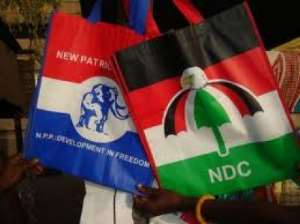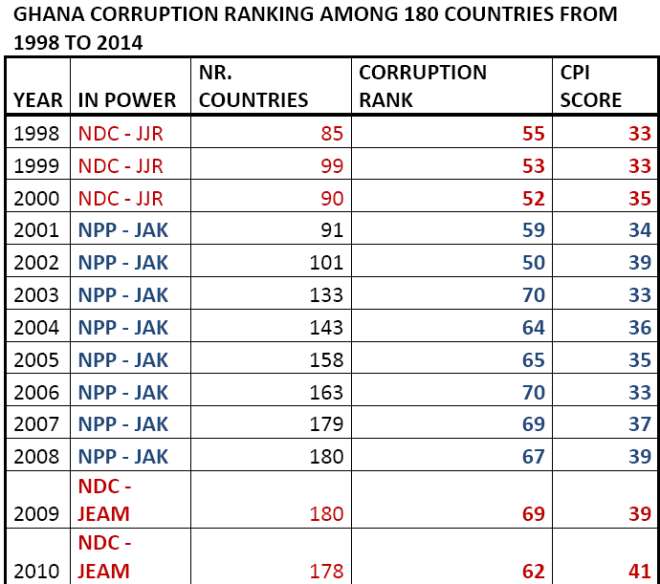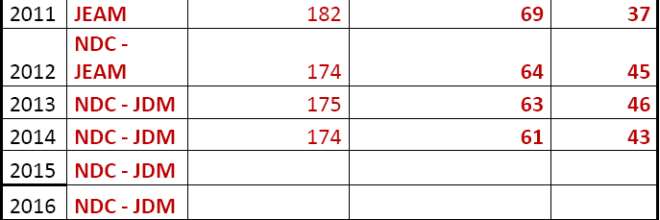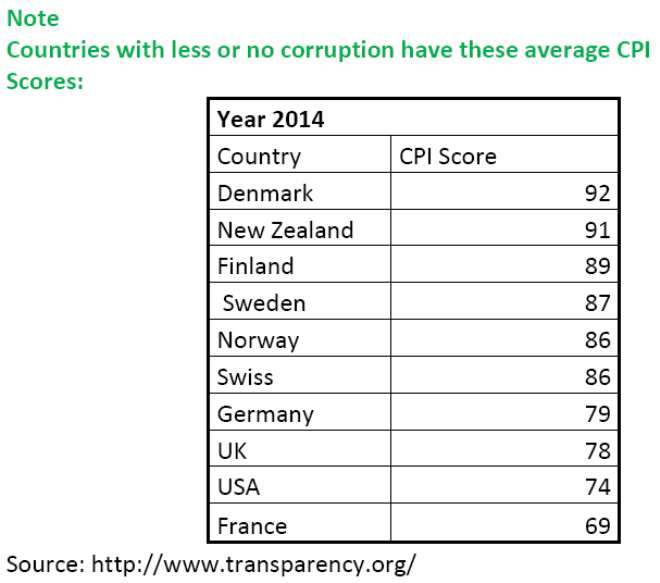
What is corruption? This question has become more important in the wake of Woyome, SADA, GYEDA, and recently NSS and microfinance saga. Can corruption be defined? Corruption has different connotations for different people. However, in general terms it is stated as an act of bribing someone to gain some benefits which may be lawful or unlawful. As a popular saying goes that before you have to pay bribe to get wrong thing done but today you have to pay for getting right things done at the right time. Corruption has become so pervasive that some people take it as an accepted way of life. The prevention of corruption defines corruption on taking gratification other than the legal remuneration in respect of an official act. Corruption can be defined as misuse of public funds for private. Corruption may be attributed to plethora of reasons like acts of commission and omission or delay, exercise or discretion as violation of rules.
Ghana Legislation codifies the act as: The Criminal Code Criminalizes corruption in the form of active and passive bribery,extortion, willful exploitation of public office, use of public office for private gain and bribery of foreign public officials. Direct and indirect corruption is illegal and both agent and principal are liable; the nationality of the person who is bribing or being bribed is irrelevant.
No one says that corruption is a good thing, in fact it is a drag on commerce and detrimental to society. In effect it tarnishes the image of the country to the outside world and makes the environment unfriendly for investors, both from local and foreign. Corruption is causing damage in Ghana and most of African countries. In fact, corruption has always been a problem in Ghana and has always been illegal. It is a barrier to trade and does need to be addressed. However, I doubt it is the major factor in the current slowdown of Ghana's economy.
We all saw the rate of corruption during NPP 8-year in office. Stealing, looting and sharing state's properties, conniving and selling state's own enterprises at cheap prices, giving contracts to favorites for kick-backs, missing of narcotic drugs under the close watch of national security, selling state vessels cheap, peddling in drugs, causing financial losses to the state with scam loans, Hotel Wawa etc (refer to declassified information below).
Now that NPP is in opposition they are accusing the NDC government of being corrupt when JA Kufour gave a false impression that his government was going to be ZERO tolerance on corruption but rather promoted corruption. It is the same government Mr Andrew Awuni served with his soul and mind. But at that time he didn't see nothing wrong with corruption. It is when he is in opposition that he can see there is corruption? NPP didn't do anything to fight corruption, NPP didn't much or didn't have any good plans to alleviate Ghana from “Dumsor”. So, why is “Kukrudu” behaving as if they are angels or non-blemish and a magic cure to our economic woes. Reports from World Transparency ranking from 1998 to 2014 put JAK-NPP in bad ranking compared to JEAM/JDM regime. It was 2002 and 2008 that NPP under JAK scared 39. The NDC under John Dramani Mahama scored 46 in 2013 and 43 in 2014. Countries which did better than Ghana are Botswana, Mauritius, Lesotho, Cape Verde, Namibia, and Rwanda, and these are countries with population less than one-fifth of Ghana. In fact, JDM needs to be praised and Ghanaians should not be ungrateful toward the good plans NDC are putting in place.
I believe NPP has no manifesto towards 2016 but using any means necessary to tarnish the image of NDC-led government. In retrospective, their precursor, UP, did the same thing to Dr Nkrumah. If NLM/UP had their own way, Ghana would have still been under British rule if it's not them in power and Volta Dam wouldn't have been built. This is UGCC/NLM/UP/PP/NPP for you.
Ghana is not alone in this economic hardship, it is a global trend, which is not caused by either Obama nor Mahama. All western countries are suffering, Holland, UK and Germany are all streamlining benefits to their citizens. Greece with a population of 11 million is have an outstanding debt of over €250 billion and currently negotiating with EU, and why people are crying of Ghana's debt of $60 billion?
To sum it up, Mr Andrew Awuni should be circumspect in his information and stop peddling falsehood to tarnish the image of Ghana and the good people of Ghana.
GHANA CORRUPTION RANKING AMONG 180 COUNTRIES FROM
1998 TO 2014
YEAR | IN POWER | NR. COUNTRIES | CORRUPTION RANK | CPI SCORE | |
| 1998 | NDC - JJR | 85 | 55 | 33 | |
| 1999 | NDC - JJR | 99 | 53 | 33 | |
| 2000 | NDC - JJR | 90 | 52 | 35 | |
| 2001 | NPP - JAK | 91 | 59 | 34 | |
| 2002 | NPP - JAK | 101 | 50 | 39 | |
| 2003 | NPP - JAK | 133 | 70 | 33 | |
| 2004 | NPP - JAK | 143 | 64 | 36 | |
| 2005 | NPP - JAK | 158 | 65 | 35 | |
| 2006 | NPP - JAK | 163 | 70 | 33 | |
| 2007 | NPP - JAK | 179 | 69 | 37 | |
| 2008 | NPP - JAK | 180 | 67 | 39 | |
| 2009 | NDC - JEAM | 180 | 69 | 39 | |
| 2010 | NDC - JEAM | 178 | 62 | 41 | |
| 2011 | NDC - JEAM | 182 | 69 | 37 | |
| 2012 | NDC - JEAM | 174 | 64 | 45 | |
| 2013 | NDC - JDM | 175 | 63 | 46 | |
| 2014 | NDC - JDM | 174 | 61 | 43 | |
| 2015 | NDC - JDM | ||||
| 2016 | NDC - JDM |
Countries with less or no corruption have these average CPI Scores:
Year 2014 | ||
| Country | CPI Score | |
| Denmark | 92 | |
| New Zealand | 91 | |
| Finland | 89 | |
| Sweden | 87 | |
| Norway | 86 | |
| Swiss | 86 | |
| Germany | 79 | |
| UK | 78 | |
| USA | 74 | |
| France | 69 |
Source: http://www.transparency.org/
DECLASSIFIED INFORMATION ABOUT CORRUPT REGIME OF NPP
Classified By: Ambassador Pamela E. Bridgewater for reasons 1.5 (D) AND (E)
1. (C) Summary: Corruption in Ghana is not as bad as in many other African countries but it is pervasive and increasingly sophisticated. That said, The GOG is committed to democracy and rule of law and Ghana has a lively media and civil society. The President faces accusations of conflict of interest and abuse of power in a hotel purchase. Those close to him are frequently implicated in corrupt practices. Allegations of corruption span from land contracts and timber concessions to shipping, public procurement and the judiciary. Corruption is hurting U.S. companies, undermining economic and democratic development, and undercutting our MPP goals. This is the first of a two-part series that looks in-depth at (part one) the nature of corruption in Ghana and (part two) what is being done about it. End summary. -------------------------------------------- ---- Balancing the Ghana Picture: Corruption Pervasive -------------------------------------------- ----
2. (C) Ghana has a well-deserved reputation for its commitment to democracy, the rule of law, and political stability. It also has a lively, generally free media, which is active in exposing corruption. President John Kufuor espoused a "zero tolerance" policy on corruption in his first inaugural address and in 2001 he fired his Youth and Sports Minister for corrupt practices. Ghana ranks 65 out of 159 countries listed in Transparency
International's 2005 Corruption Perceptions Index. On the African continent, only Botswana, Tunisia, South Africa and Namibia were perceived to have less corruption. In fact, Ghana's corruption score is the best between the Sahara and the Kalahari. Its score is now the same as in 2000, when President Kufuor swept into power in part on a pledge of zero tolerance for corruption.
3. (C) Nonetheless, corruption in Ghana is pervasive and perceived to be growing. Per ref b, in a recent survey of three major Ghanaian cities done by the Ghana Integrity Initiative (the local affiliate of Transparency International) 92% of respondents considered corruption a serious problem in Ghana. During a November 15 World Bank-sponsored seminar on fighting corruption, prominent Ghanaian economist and Executive Director of the Center for Economic Policy Analysis Joe Abbey offered his list of the top ten most corrupt GOG institutions: the police, the Ministry of Education, the customs service, the judiciary, the civil service, the health services, politicians, the electricity company, the Internal Revenue Service, and the Immigration Service.
4. (C) Ghanaians in the GII study and a similar study by the Center for Democratic Development (CDD), published in July 2005 (ref a), perceived corruption to be increasing. In the CDD survey, the perception that corruption is commonplace increased between 2002 and 2005 for every public institution covered. The NEPAD African Peer Review report (which we have seen but has not yet been published) also finds that corruption is a growing problem and "remains prevalent in all spheres of Ghana". Over the past six years (including the last two years of former President Rawlings' PNDC), Ghana's Corruption Perception Index score has stagnated at the bottom third of the
Transparency International list, with scores ranging between 3.3 and 3.9 (the 2005 score of 3.5 was a slight dip from 3.6 in 2004 and worse than the 3.9 score in 2002). ----------------------- Opportunistic Corruption ------------------------
5. (C) Our contacts allege many examples of large-scale corruption, many of which focus on the President's office (including Chief of Staff Kwado Mpiani), the President,s family, and a few key insiders. While verifiable information on corrupt practices is almost impossible to obtain, below are some credible examples: Land Deals: In 2004, then-Minister of Environment Kasim Kasanga told former PolChief about an extensive practice in which GOG ministers, and friends, relatives and business associates of the President and other top officials are given, without charge, legal title to choice urban parcels in Accra and regional capitals. After receiving title to the parcels, recipients generally sell the land on the local real estate market at enormous profits. Many other contacts have confirmed this practice.
While government allocation of land to private persons is common and legal throughout Africa, it is also a type of cronyism used to build and sustain political power. Timber Concessions: Kasanga said he had canceled 42 timber concessions upon assuming office as Lands and Forestry Minister in 2001 because they were done by the previous government in violation of timber laws. In 2003, after Kasanga was transferred out of the Ministry, the concessions were reallocated, with the choice concessions awarded to GOG insiders, he said. According to Kasanga, President Kufuor was aware of these practices but left the details to subordinates in the Presidency.
A Dutch diplomat recently told Poloff that when the Dutch pressed for greater transparency in timber leases, the president's office called the Deputy Minister of Finance instructing him to resist for "national security" reasons. Public Contracts: GII Director Batidam estimates that public procurement accounts for 70% of corruption in Ghana. According to the CEO of Ghana's Public Procurement Board, 25% of the $750 million channeled through the GOG's public procurement system in 2004 (i.e. $188 million) was lost due to "mismanagement." GII studied Ghana Telecom procurement in depth and found 2.2 billion cedis ($244,000) of losses due to corruption in one contract alone. The editor of the Enquirer newspaper alleged to PolChief that the former Information Minister padded a Ghana Broadcasting Corporation contract by $6 million, circumventing procurement rules.
Defense Minister Kwame Addo Kufuor, one of the President,s brothers, enriched himself in the procurement of helicopters and South African arms, using business ties involving family members. The editor of a major daily told PolChief several companies offered $20 million in bribes to obtain contracts to build a stadium for the Confederation of African Football games in Accra in 2008. The president,s staff was complicit, he said, although the president's role is unclear. In November 2005, an accountant at the Department of Urban Roads in Kumasi was caught diverting 4.3 billion cedis (around $480,000) of public contracts into his personal account. The U.S. team of Ghana's new national air carrier, Ghana International Airways (GIA), told econoffs they had been told they could reduce the ill will of some members of the President's staff by awarding contracts to certain companies that had been affiliated with the now-defunct Ghana Airways, specifically the French ground service provider Aviance.
GIA managers speculate their first flight was delayed at least six months by their refusal to consider any such deals. Alcoa, currently negotiating with the GoG over their proposal to build an integrated aluminum industry, reports that GoG interlocutors asked for $3 million to fund an internal public relations campaign to promote the industry within the various ministries involved in the negotiations. When Alcoa officials asked for a line-item budget to justify the cost, their interlocutors could not produce one. When GoG negotiators complained about not having personnel experienced enough to fully evaluate Alcoa's proposals, Alcoa submitted a list of consultants recognized industry-wide for their competence and offered to pay for any work contracted. GoG officials refused, but submitted a list of Ghanaian experts (all GOG officials) and asked that Alcoa pay them instead. Alcoa refused the proposal.
Party Politics: According to the Ghana section of the National Democratic Institute's 2005 publication "Money and Politics", "Either because of campaign debts or simply because they have the opportunity to do so with impunity, public officials are widely rumored to collect a 10 percent cut in exchange for awarding various government contracts. It is believed that those funds benefit both individuals and political parties." In a scandal currently dominating the news, the independent daily The Enquirer claims to have taped recordings of the ruling NPP party chairman discussing with the President and his officers how the presidency provides funds to the party (in bags of cash left in the trunk of the chairman's car) derived from kickbacks from government contracts. (Comment: PolChief has discussed this allegation with the author of the article and other journalists and finds the story credible. End Comment.) Shipping: Over/under invoicing, petty bribes, and falsified duties and bond documents are commonplace at Ghana's ports and customs offices. Customs officials have reportedly established a color-coded system for suitcases of cash to ensure they get properly distributed.
The Serious Fraud Office is investigating the NEPAD Minister's assistant for misusing funds at the Free Trade Zone. Recent visits by US Customs and Border Protection and the Coast Guard to port, airport, and border stations found uncontrolled public access to inspection areas and shoddy records. The Embassy has offered to fund an internal investigatory unit for Ghana's Customs, Excise, and Preventative Services (CEPS). CEPS claims it cannot find the funds for office space needed for the unit. CEPS officials responsible for investigating corruption have indicated confidentially to Poloffs that CEPS senior officials are not eager to establish a unit which would reduce corruption.
The HIPC fund: The $200 million in funds made available annually through the Highly Indebted Poor Country Initiative (HIPC) are reportedly a source of significant corruption. Senior Minister Mensah (brother-inlaw of the president) controls the HIPC funds, and uses these resources to fund the GOG's patronage network. Deputy Minister of Finance and Economic Planning Akoto Osei recently admitted to reporters that he could not account for 27.6 billion cedis (just over $3 million) of HIPC funds dispersed through his Ministry in 2004, listing the expenditures in his report to Parliament as "other." Accountability of HIPC funds should improve under the 2006 budget, which increases Finance Ministry control over the funds and improves transparency in their allocation.
Education Sector: Assistant Director of the Serious Fraud Office A. Tetteh Mensah told Poloff that the Ministries of Health and Education have the greatest misallocation of funds in the GOG, especially from schools and clinics that were paid for but never built, and the inclusion of thousands of "ghost" employees on their payrolls. (In 2001, the Minister of Finance reported that "ghost names" on public payroll alone cost the state an estimated $33 million -- 300 billion cedis -- in financial losses annually. The GOG has made some effort to address this but there is still not a functional system for tracking all GOG employees on the payroll.) In the GII study, the Ministry of Education was perceived as the second most corrupt government entity. On September 2, police revealed that 200 million cedis ($22,000) had been embezzled by a Ghana Education Service employee in Upper East Region. In October, 2005, the media reported on the Ministry of Education,s decision to sole source a $28 million contract for books without seeking the required prior approval from the Public Procurement Board.
The Kufuor Hotel: In May, 2005, an Iraqi-American named Gizelle Yajzi claimed she had tapes proving that President Kufuor purchased a $3.5 million hotel near the presidency, using his son as a front man. This case dominated media attention for weeks, raising criticisms of conflict of interest and abuse of power. (The President has denied involvement in the deal.) The judiciary: Supreme Court Chief Justice Kingsely Acquah admitted to Ambassador Yates in her farewell call that judicial corruption is a "big, terrible problem". He noted that police recently discovered a judicial clerk embezzling funds using duplicate stamps. In July, the Judicial Council charged two High Court judges with stealing 115 million cedis ($13,000) deposited as fines. ------- Comment -------
6. (C) While Ghana has good democratic credentials, it has some serious governance challenges. We should not be surprised that corruption is prevalent and that there are top officials involved, as happens elsewhere in the world. At the root of the petty corruption are low public sector salaries, poverty, weak institutions and a cultural tolerance for spreading patronage that will not be changed quickly. This is especially the case in a climate of relative impunity in which opportunistic corruption is tolerated.
The dominance of the public sector, combined with a burgeoning of donor funding (estimated at over $1.2 billion in grants and loans for 2006), continues to create greater opportunity for corruption. With those around the President realizing that he cannot be returned to office in 2008, and that opportunities for personal enrichment are relatively short-lived, and with the constant requirement for campaign funds at lower levels, official corruption is likely to continue at a high level. Ghana's free media has also gotten somewhat better at making us aware of corruption. While this has increasingly stirred public debate, so far it has not spurred the GOG to make a convincing effort to tackle corruption.
We do not doubt that Ghana is among the best in sub-Saharan Africa in terms of corruption, but its presence here as a very serious problem should be an indication of the long term difficulties in bringing Western-style development in the near future. BRIDGEWATER
Thank you for reading this small piece!!!!
Lewis Kwame Addo
Amsterdam







 Meta releases new version of conversational AI across its platforms
Meta releases new version of conversational AI across its platforms
 Cape Town named Africa’s Best Airport 2024 by Skytrax
Cape Town named Africa’s Best Airport 2024 by Skytrax
 Bono East: Four injured after hearse transporting corpse crashes into a truck
Bono East: Four injured after hearse transporting corpse crashes into a truck
 ‘Be courageous, find your voice to defend our democracy’ — Sam Jonah urges journ...
‘Be courageous, find your voice to defend our democracy’ — Sam Jonah urges journ...
 Exodus of doctors, nurses and teachers have worsened because of unserious Akufo-...
Exodus of doctors, nurses and teachers have worsened because of unserious Akufo-...
 2024 election: Avoid insults, cutting down people in search of power – National ...
2024 election: Avoid insults, cutting down people in search of power – National ...
 ‘You passed through the back door but congratulations’ — Atubiga on Prof Jane Na...
‘You passed through the back door but congratulations’ — Atubiga on Prof Jane Na...
 Government’s $21.1 billion added to the stock of public debt has been spent judi...
Government’s $21.1 billion added to the stock of public debt has been spent judi...
 Akufo-Addo will soon relocate Mahama’s Ridge Hospital to Kumasi for recommission...
Akufo-Addo will soon relocate Mahama’s Ridge Hospital to Kumasi for recommission...
 We must not compromise on our defence of national interest; this is the time to ...
We must not compromise on our defence of national interest; this is the time to ...
